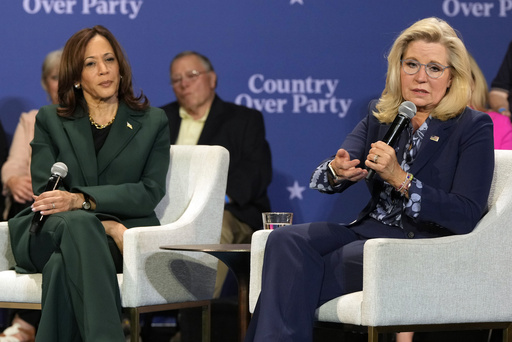
Progressive Democrats are expressing concerns that Kamala Harris might alienate a pivotal segment of her political support unless she swiftly alters both her campaign’s closing message and the individuals delivering it. Many progressive figures argue that the Democratic nominee’s recent focus on attracting moderate Republicans is coming at a cost—namely, the enthusiasm and loyalty of her party’s committed liberal base. They believe Harris’ current messaging, which emphasizes the threats posed by Republican Donald Trump to American democracy, overlooks the pressing economic challenges facing working-class citizens.
There is particular frustration among some left-leaning leaders regarding Harris’ appearances alongside prominent figures such as former House Republican leader Liz Cheney and billionaire entrepreneur Mark Cuban. They feel that more renowned progressive advocates, including Senator Bernie Sanders of Vermont and Representative Alexandria Ocasio-Cortez from New York, have not been sufficiently featured in the campaign, relegating them to lesser roles. Sanders highlighted that many working-class voters could be potential supporters of Harris compared to the limited number of conservative Republicans likely to back her campaign. He has actively participated in various events related to Harris’ campaign, mostly in rural areas, and emphasizes the need for Harris to address working-class concerns more directly.
Amidst a tight election timeline, with less than two weeks until Election Day, the Harris campaign is attempting to forge a broad coalition that encompasses both conflicting priorities and traditional Democratic supporters, such as African Americans, Latinos, and younger voters. While aware that some liberals may be displeased with her approach—especially regarding her stance on the ongoing conflict between Israel and Hamas—her campaign sees an opportunity to attract disenchanted Republicans, particularly educated suburban voters who are wary of Trump.
From the campaign’s viewpoint, engaging moderate Republicans is primarily a strategic calculation. According to an anonymous aide, about 10% of crucial swing-state voters remain undecided, with a considerable portion being “Cheney Republicans” open to messages critical of Trump. However, the Harris campaign believes that her most significant electoral hurdle may be the narrative that she is too far left, as this perception is being perpetuated by Trump’s allies. Consequently, Harris has avoided close association with progressive figures like Sanders, despite his support for her.
Harris is slated to deliver a key address next week, presenting a formal closing argument centered around the dangers posed by Trump to American democracy. This speech will take place at the Ellipse in Washington, an area historically linked to significant political events, notably one preceding the insurrection at the U.S. Capitol on January 6, 2021.
Progressive leaders are eager for Harris to shift her focus towards the economy, expressing concern that while addressing Trump’s authoritarian tendencies is crucial, her messaging should also reflect the public’s growing anxieties about economic well-being and national direction. Adam Green, co-founder of the Progressive Change Campaign Committee, acknowledged the smart advertising strategy that has emphasized issues like grocery prices and taxes on billionaires. However, he pointed out an inconsistency between the campaign’s economic messaging and its public events, which seem overly fixated on conciliatory optics with Cheney that could disengage the base.
Moreover, there are growing worries that the current campaign strategy could lead to disillusionment among progressives, with some estimates suggesting that as much as 10% may choose not to vote for Harris. Joseph Geevarghese, the executive director of Our Revolution, cautioned that without addressing economic issues explicitly, her campaign risks underestimating the progressive base’s desire for substantive economic arguments that resonate with voters.
Issues of the economy are particularly significant, as recent polling shows a substantial portion of potential voters prioritize economic concerns over other issues. In light of this, Harris has proposed several measures, including combatting corporate price gouging, reducing prescription drug costs, and extending tax relief for first-time homebuyers, among other progressive commitments. Efforts have also been made by progressive figures, including Ocasio-Cortez, who campaigned in swing states to bolster support for Harris.
While former President Barack Obama remains a cherished figure among progressive voters and has been active in the closing stages of the campaign, Trump continues to focus on key issues such as the economy, immigration, and crime, aiming to connect with average Americans dissatisfied with the current state of affairs. Trump’s closing message is anticipated to reinforce his narrative of being a solution to perceived failures, continually posing the question of whether Americans are better off than four years ago.
Harris acknowledged in a recent town hall that some progressives might be dissatisfied with her positions, especially concerning Israel, yet she also pointed out the need for voters to address pressing economic issues and the requirement for a leader who values democratic principles over authoritarianism.
